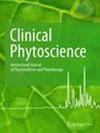Abrus precatorius 种子甲醇提取物对雌性白化大鼠生殖指数和肝肾特征的影响
引用次数: 0
摘要
Abrus precatorious 是豆科植物,种子呈红色和黑色。这种植物的根、叶和种子有不同的药用价值。它主要含有黄酮类化合物、三萜苷、鞣质和生物碱。该植物具有神经肌肉作用、神经保护作用、堕胎作用、抗癫痫作用、抗病毒作用、抗疟作用、抗生育作用、肾脏保护作用、免疫调节作用、免疫刺激作用、抗炎活性、抗糖尿病作用等。本研究的目的是调查雌性白化大鼠在连续 30 天口服 45 和 50 毫克/千克体重的 Abrus precatorius 种子甲醇提取物(APS)后的抗生育活性。用甲醇提取 Abrus precatorius 种子(APS)(1:1 w/v),得到粗提取物。使用不同极性的溶剂对粗甲醇提取物进行液-液分馏。实验将 18 只雌性大鼠分为三组,每组 6 只。第一组(对照组)接受 1 毫升生理盐水,第二组接受 45 毫克/千克,第三组接受 50 毫克/千克体重,每天口服,为期 30 天。研究结束时,还对体重、器官重量、发情周期、荷尔蒙浓度、氧化应激标志物、酶活性、生化指标(肝脏和肾脏面板)和血液学参数进行了评估。与对照组大鼠相比,给雌性大鼠服用 A.precatorius 种子甲醇提取物 45 和 50 毫克/千克体重后,体重、发情周期、荷尔蒙浓度、抗氧化酶、血清生化指标和血液学指标都发生了显著变化(p < 0.05)。初始体重明显增加(p < 0.05),而最终体重明显减少(p < 0.05)。与对照组相比,APS 给药大鼠的器官重量变化,即卵巢、肝脏和肾脏重量明显下降(p < 0.05)。发情周期研究,即前发情期、发情期、雌发情期和绝发情期的持续时间(天数)明显延长。与对照组相比,服用 APS 的雌性大鼠体内 FSH、LH、催乳素和雌二醇等激素浓度明显降低(p < 0.05),而孕酮水平则明显升高(p < 0.05)。所有测定的抗氧化酶 CAT、SOD、GPx、GR 和 GST 均明显下降(p < 0.05),而 MDA 浓度则明显升高(p < 0.05)。与对照组相比,给药 APS 组雌性大鼠的胆固醇和抗坏血酸等酶活性和生物大分子含量明显增加(p < 0.05),但 G6PDH 和 Δ5 - 3β-HSD 活性明显降低(p < 0.05)。胆红素、SGPT、SGOT、白蛋白和球蛋白等肝组织生化指标明显升高(p < 0.05),而碱性磷酸酶和总蛋白含量则明显降低(p < 0.05)。与对照组大鼠相比,服用 APS 的雌性大鼠的肾脏生化指标,即尿素和肌酸酐明显增加(p < 0.05),尿酸和钙含量明显减少(p < 0.05)。与对照组大鼠相比,APS 给药组雌性大鼠的 RBC、Hb、ESR 和凝血时间等血液学参数明显增加(p < 0.05),但白细胞水平明显增加(p < 0.05)。A. Precatorius 种子对雌性大鼠具有抗生育作用。本文章由计算机程序翻译,如有差异,请以英文原文为准。
Methanol extract of Abrus precatorius seeds on reproduction indices, hepatorenal profiles in female albino rats
Abrus precatorious is a member of the leguminous family with characteristic red and black seeds. The roots, leaves and seeds of this plant are used for different medicinal purpose. It principally carries flavonoids, triterpene glycosides, abrin and alkaloids. The plant had been mentioned for neuromuscular effects, neuro-protective, abortifacient, antiepileptic, anti-viral, antimalarial, antifertility, nephroprotective, immunomodulator, immunostimulatory properties, antiinflammatory activity, antidiabetic, and many others. The aim of this study was to investigate the anti-fertility activity of the methanol extract of Abrus precatorius seeds (APS) in female albino rats administered 45 and 50 mg/kg BW through oral gavage for 30 days. An Abrus precatorius seed (APS) was extracted (1:1 w/v) using methanol to obtain the crude extract. Liquid-liquid fractionation was performed on the crude methanol extract using solvents of different polarity. Eighteen female rats were divided into three groups each containing six animals was used for this experiment. Group one (control), received 1 ml of saline solution, group two received 45 mg/kg and group three received 50 mg/kg body weight by oral gavage daily for a period of 30 days. At the end of the study, Body weight, Organ Weight, Estrous cycle, Hormonal Concentrations, Oxidative Stress Markers, Enzymatic Activities, Biochemical indices (Liver and Kidney panel) and Hematological parameters were also evaluated. Consequent upon the administration of A.precatorius seed methanol extract 45 and 50 mg/kg BW into the female rats resulted in changes pertaining to Body weight, Estrous cycle, Hormonal Concentrations, Antioxidant Enzymes, Serum Biochemical indices and Hematological indices significantly (p < 0.05) compared to control rats. Initial body weights are significantly (p < 0.05) indicated, whereas final weights were decreased significantly (p < 0.05). Organ weight changes i.e. Ovary, Liver and Kidney weights were found to be significantly (p < 0.05) decreased in APS administered rats compared to control. Estrous cycle study i.e. time duration of Proestrus, Estrus, Metestrus and Diestrus (in days) was significantly prolonged. Hormonal Concentrations represented by FSH, LH, Prolactin, Estradiol were significantly (p < 0.05) decreased, whereas Progesterone levels were significantly (p < 0.05) increased in APS administered female rats compared to control group of rats. All the antioxidant enzyme assayed CAT, SOD, GPx, GR and GST were found to be significantly (p < 0.05) decreased, whereas MDA concentration was found to be increased significantly (p < 0.05). Enzymatic activities and biomolecules includes Cholesterol and Ascorbic acid contents were significantly increased (p < 0.05), but G6PDH and Δ5 − 3β-HSD activities were found to be significantly (p < 0.05) decreased in APS administered group of female rats compared to control group. Biochemical indices of liver tissue presented by Bilirubin, SGPT, SGOT, Albumin and Globulin were found to be significantly (p < 0.05) increased whereas Alkaline Phosphate and Total Protein contents were found to be significantly (p < 0.05) decreased. The biochemical indices of kidney, i.e. Urea and Creatinine were significantly (p < 0.05) increased and Uric acid and Calcium contents were found to be significantly (p < 0.05) decreased in APS administered female rats compared to control group of rats. Hematological parameters including RBC, Hb, ESR and Clotting Time were found to be significantly (p < 0.05) increased but WBC levels were significantly (p < 0.05) increased in APS administered female rats compared to control group of rats. A. Precatorius seeds have anti-fertility effect on female rats.
求助全文
通过发布文献求助,成功后即可免费获取论文全文。
去求助
来源期刊
自引率
0.00%
发文量
18
审稿时长
13 weeks
期刊介绍:
Clinical Phytoscience is an international, peer-reviewed, interdisciplinary, and open access journal publishing high quality research articles on clinical evidence and use of medicinal plants in the development of efficient and well tolerated phytotherapy. Clinical Phytoscience focuses on phytotherapy, looking at proof of concept, efficacy and safety, to be established “at eye level” compared to pharmacotherapy. The emphasis lies on application oriented topics (efficacy and safety of phytotherapy in a specific indication, including its need and acceptance by the patient). The scientific results published in the journal should contribute to the recovery and maintenance of human health by phytotherapy. Clinical Phytoscience will publish high-quality evidence-based clinical studies and relevant pharmacological studies. Key areas of interest are: -Upper and lower airways, ENT and pneumology -Gynecology -Urology -Nephrology Pediatrics -Intestinal tract -Hepatology -Diabetes/metabolic Syndrome -Immunology and microbiology -Hygiene -Analytics

 求助内容:
求助内容: 应助结果提醒方式:
应助结果提醒方式:


